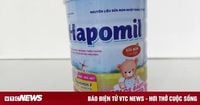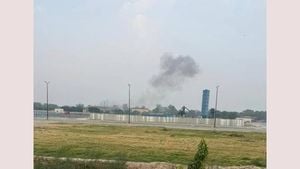On April 19, 2025, the Ministry of Health in Vietnam took decisive action in response to the alarming rise of counterfeit milk and medicine affecting hospitals across the country. During a conference held by the Northern Hospital Directors Club in Hải Dương, TS.BS Hà Anh Đức, the head of the Department of Medical Examination and Treatment Management, emphasized the critical need for hospitals to review their usage of milk products. This review is aimed at ensuring patient safety and addressing the serious health risks posed by these counterfeit products.
"The situation of fake medicine and fake milk has been extremely painful," stated TS Đức, highlighting the direct impact these products have on the health of the Vietnamese population. The Ministry of Health has mandated that hospitals assess when and for whom these milk products were used, ensuring they maintain detailed records of all patients who consumed them. This initiative comes in light of recent investigations revealing that some hospitals had inadvertently distributed milk from companies under suspicion of producing counterfeit products.
In his remarks, TS Đức made it clear that if any health issues arise from the consumption of these milk products, medical facilities will be held accountable for advising patients appropriately. "If there are health problems related to milk products, medical facilities are responsible for advising patients," he asserted.
Additionally, TS Đức addressed the responsibilities of medical professionals regarding prescriptions. He stated that the Ministry has established clear regulations governing the prescribing of medications. Should violations occur, they will be addressed with administrative or even criminal penalties, depending on the severity of the infraction. "The Ministry's stance is to handle violations strictly, with no cover-ups or forbidden zones if infractions are detected by functional agencies," he emphasized.
The Ministry of Health plans to release a formal document early next week, around April 21, 2025, instructing hospital directors to rectify their processes regarding the prescribing and sale of medications, as well as the provision of services within hospitals. Hospital leaders will be held directly responsible for ensuring compliance with these regulations.
In a broader context, the Prime Minister of Vietnam, Phạm Minh Chính, has also intervened by issuing a directive that calls for the Ministry of Public Security to expedite the investigation into the production and trading of fake medicines and milk. The Prime Minister's directive emphasizes the urgency of resolving this issue, as counterfeit products pose a significant threat to public health and safety.
Furthermore, the Prime Minister has instructed the Ministry of Health to work closely with the Ministry of Public Security throughout the investigation process, underscoring that counterfeit medicines and health protection foods directly affect the health and lives of citizens. He has also called for the immediate recall of any fake medicines and health products that have been identified.
As part of the Ministry's ongoing efforts to enhance clinical nutrition practices, TS Đức mentioned that the latest circular issued in 2024 includes a list of clinical nutrition techniques. These guidelines are intended to support healthcare professionals in providing better nutritional advice to patients, particularly those suffering from malnutrition. The Ministry aims to improve its clinical nutrition practices, which have seen success in more developed countries.
In light of recent findings, some hospitals have already taken proactive measures to address the issue of counterfeit milk. After conducting internal reviews, several hospitals discovered that milk products from companies under investigation had been circulated within their facilities. These hospitals confirmed they had followed proper bidding procedures and acted swiftly to halt consultations regarding these products once suspicions arose. Any milk that was imported has been recalled and returned to the suppliers.
These hospitals have stated that should authorities conclude that the products in question are indeed counterfeit, both the hospitals and the patients who consumed the milk would be considered victims in this situation. They have pledged to support patients in reclaiming their legitimate rights.
The health crisis surrounding counterfeit milk and medicine is not just a local issue; it reflects a growing concern about product safety and regulation in healthcare settings. As the Ministry of Health intensifies its scrutiny of milk usage in hospitals, it hopes to restore public confidence in the safety of medical products and services.
As the investigation unfolds, the Ministry of Health's commitment to transparency and accountability will be critical in addressing public fears. The collaboration between health authorities and law enforcement is a positive sign that the government is taking these issues seriously. The Ministry's proactive stance is likely to serve as a deterrent against future violations and ensure that patient safety remains the top priority.
In conclusion, the Vietnamese government's response to the counterfeit milk and medicine crisis marks a significant step towards safeguarding public health. With ongoing investigations and stricter regulations, there is hope that the integrity of healthcare services will be upheld, and that patients can receive the quality care they deserve without the fear of counterfeit products jeopardizing their health.





